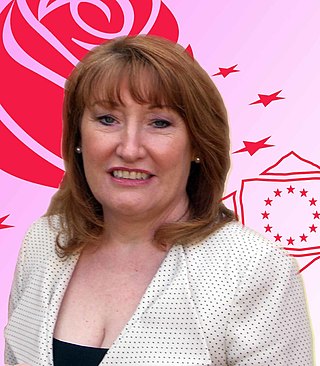
The United Kingdom European Communities membership referendum, also known variously as the Referendum on the European Community (Common Market), the Common Market referendum and EEC membership referendum, took place under the provisions of the Referendum Act 1975 on 5 June 1975 in the United Kingdom to gauge support for the country's continued membership of the three European Communities (EC) – principally the European Economic Community (EEC, the 'Common Market'), the European Atomic Energy Community (Euratom), and the European Coal and Steel Community (ECSC). — which it had joined as a member state two-and-a-half years earlier on 1 January 1973 under the Conservative government of Edward Heath. The Labour Party's manifesto for the October 1974 general election had promised that the people would decide through the ballot box whether to remain in the EC.

John Douglas Wilson Carswell is a British former politician who served as a Member of Parliament from 2005 to 2017, co-founded Vote Leave and currently serves as president and CEO of the Mississippi Center for Public Policy.

Euroscepticism in the United Kingdom is a continuum of belief ranging from the opposition to certain political policies of the European Union to the complete opposition to the United Kingdom’s membership of the European Union. It has been a significant element in the politics of the United Kingdom (UK). A 2009 Eurobarometer survey of EU citizens showed support for membership of the EU was lowest in the United Kingdom, alongside Latvia and Hungary.

David Campbell Bannerman is a British politician who served as Member of the European Parliament (MEP) for the East of England from 2009 to 2019. He is currently Chairman of the Conservative Democratic Organisation and The Freedom Association. A member of the Conservative Party, he previously served as Deputy Leader of UK Independence Party (UKIP) from 2006 until 2010, when he was replaced by Paul Nuttall.

Dame Glenis Willmott, is a retired British Labour Party politician who served as leader of the European Parliamentary Labour Party (EPLP) and Member of the European Parliament for the East Midlands.

Anna Mary Soubry is a British barrister, journalist and politician who was Member of Parliament (MP) for Broxtowe from 2010 to 2019. Known for her support of pro-European policies, she was originally elected as a Conservative but left the party to join Change UK in 2019.

The European Conservatives and Reformists (ECR) is a soft Eurosceptic, anti-federalist political group of the European Parliament. The ECR is the parliamentary group of the European Conservatives and Reformists Party European political party (formerly known as the Alliance of Conservatives and Reformists in Europe or Alliance of European Conservatives and Reformists, but also includes MEPs from four other European parties and thirteen MEPs without European party affiliation.

Sarah Wollaston is a British former Liberal Democrat politician who served as Member of Parliament (MP) for Totnes from 2010 to 2019. First elected for the Conservative Party, she later served as a Change UK and Liberal Democrat MP. She was chair of the Health Select Committee from 2014 to 2019 and chair of the Liaison Committee from 2017 to 2019.

The United Kingdom European Union membership referendum also known as the EU referendum or the Brexit referendum, took place in the United Kingdom (UK) and Gibraltar on 23 June 2016 to ask the electorate whether the country should remain a member of, or leave, the European Union (EU). The referendum resulted in 51.9% of the votes cast being in favour of leaving the EU, triggering calls to begin the process of the country's withdrawal from the EU commonly termed "Brexit".

Brexit was the withdrawal of the United Kingdom (UK) from the European Union (EU). Following a referendum on 23 June 2016, Brexit officially took place at 23:00 GMT on 31 January 2020. The UK is the only sovereign country to have left the EU. The UK had been a member state of the EU or its predecessor, the European Communities (EC), since 1 January 1973. Following Brexit, EU law and the Court of Justice of the European Union no longer have primacy over British laws. The European Union (Withdrawal) Act 2018 retains relevant EU law as domestic law, which the UK can amend or repeal.

Paul Stuart Scully is a former British politician who served as the Member of Parliament (MP) for Sutton and Cheam from 2015 to 2024. A member of the Conservative Party, he served as Minister for London from February 2020 and Parliamentary Under-Secretary of State for Tech and the Digital Economy from October 2022. He was sacked from both roles in November 2023.

The European Union Referendum Act 2015 was an Act of the Parliament of the United Kingdom that made legal provision for a consultative referendum to be held in the United Kingdom and Gibraltar, on whether it should remain a member state of the European Union or leave the bloc altogether. The Bill was introduced to the House of Commons by Philip Hammond, Foreign Secretary on 28 May 2015. Two weeks later, the second reading of the Bill was supported by MPs from all parties except the SNP; the Bill subsequently passed on its third reading in the Commons on 7 September 2015. It was approved by the House of Lords on 14 December 2015, and given Royal Assent on 17 December 2015. The Act came partly into force on the same day and came into full legal force on 1 February 2016.

Vote Leave was a campaigning organisation that supported a "Leave" vote in the 2016 United Kingdom European Union membership referendum. On 13 April 2016 it was designated by the Electoral Commission as the official campaign in favour of leaving the European Union in the Referendum.

Labour Leave is a Eurosceptic campaign group in the United Kingdom. The group is unofficially affiliated with the Labour Party, and campaigned for the United Kingdom to vote to withdraw from the European Union, in the June 2016 EU Referendum. The group was led by eurosceptic Labour MPs: Graham Stringer, Kelvin Hopkins, and Roger Godsiff.

Campaigning in the United Kingdom European Union membership referendum began unofficially on 20 February 2016 when Prime Minister David Cameron formally announced under the terms of the European Union Referendum Act 2015 that a referendum would be held on the issue of the United Kingdom's membership of the European Union. The official campaign period for the 2016 referendum ran from 15 April 2016 until the day of the poll on 23 June 2016.
After the British EU membership referendum held on 23 June 2016, in which a majority voted to leave the European Union, the United Kingdom experienced political and economic upsets, with spillover effects across the rest of the European Union and the wider world. Prime Minister David Cameron, who had campaigned for Remain, announced his resignation on 24 June, triggering a Conservative leadership election, won by Home Secretary Theresa May. Following Leader of the Opposition Jeremy Corbyn's loss of a motion of no confidence among the Parliamentary Labour Party, he also faced a leadership challenge, which he won. Nigel Farage stepped down from leadership of the pro-Leave party UKIP in July. After the elected party leader resigned, Farage then became the party's interim leader on 5 October until Paul Nuttall was elected leader on 28 November.
The European Union (Referendum) Bill 2013–14 was a private member's bill of the Parliament of the United Kingdom designed to make provision for a referendum on membership of the European Union to be held in 2017 following renegotiation of terms between the European Union and the United Kingdom government. The bill ceased to be considered by Parliament after January 2014 and did not become law. However, a subsequent bill with the same objective, the European Union Referendum Act 2015, was later introduced to the House of Commons by the newly elected Conservative government in May 2015 was passed and received royal assent on 17 December 2015.
A by-election for the House of Commons constituency of Sleaford and North Hykeham in Lincolnshire, England, was held on 8 December 2016. It was triggered by the resignation of the Conservative member of parliament (MP) Stephen Phillips, who left Parliament on 4 November 2016 due to policy differences with the Conservative government led by the prime minister, Theresa May, over Brexit – the British withdrawal from the European Union (EU). The Conservatives nominated Caroline Johnson, a paediatrician, to replace Phillips; she won the by-election with more than 50 per cent of the vote, a sizable majority. The Conservatives' vote share fell slightly compared to the result at the previous general election in 2015.

A referendum on the Brexit withdrawal agreement, also referred to as a "second referendum", a "rerun", a "people's vote", or a "confirmatory public vote", was proposed by a number of politicians and pressure groups as a way to break the deadlock during the 2017–19 Parliament surrounding the meaningful vote on the Brexit deal.
Brexit was the withdrawal of the United Kingdom from the European Union at 23:00 GMT on 31 January 2020. As of 2020, the UK is the only member state to have left the EU. Britain entered the predecessor to the EU, the European Communities (EC), on 1 January 1973. Following this, Eurosceptic groups grew in popularity in the UK, opposing aspects of both the EC and the EU. As Euroscepticism increased during the early 2010s, Prime Minister David Cameron delivered a speech in January 2013 at Bloomberg London, in which he called for reform of the EU and promised an in–out referendum on the UK's membership if the Conservative Party won a majority at the 2015 general election. The Conservatives won 330 seats at the election, giving Cameron a majority of 12, and a bill to hold a referendum was introduced to Parliament that month.














